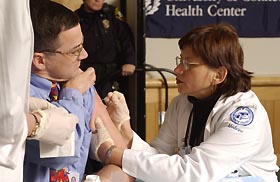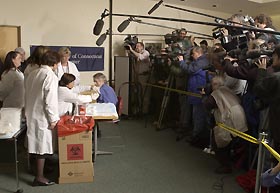|
This is an archived article.
For the latest news, go to the Advance
Homepage
For more archives, go to the Advance Archive/Search Page. |
||||
|
Health Center Doctors First
To Receive Smallpox Vaccine By Pat Keefe Three School of Medicine physicians and the state's epidemiologist made medical history Jan. 24 at the Health Center when they were vaccinated against smallpox. The moment, in the Faculty/Staff Dining Room off the Food Court, was recorded by a score of television cameras and newspaper and wire-service photographers from around the world and in the presence of Centers for Disease Control experts and state Department of Health officials.
The vaccination was the start of a federal program, known locally as the Genesis program, to inoculate medical first responders against smallpox in case of a bioterrorist attack. First responders include emergency department physicians, nurses and aides, state and local health department officials, and emergency medical services staff, such as emergency medical technicians, police, firefighters, and rescue workers. The vaccinations against smallpox were the first in the United States in more than 30 years. Drs. James Hadler, state epidemiologist, Richard Garibaldi, professor of medicine and chair of the Department of Medicine, and Robert Fuller, assistant professor of traumatology and emergency medicine and medical director of the Emergency Department, were the physicians who received the vaccinations publicly. Dr. Marcia Trape-Cardoso, associate professor of medicine, and clinical director of the Division of Occupational and Environmental Medicine, administered the vaccines, after receiving training from experts from the Centers for Disease Control. She was the first doctor vaccinated in the program. "Friday was satisfactory from the point of view that we received the vaccine and started some people moving through the immunization program," said Dr. Michael Grey, interim head of occupational and environmental medicine, director of the Genesis team, and the Health Center's coordinator of the smallpox immunization program. "Everybody did a good job and the clinical staff had a chance to work out the jitters in handling the vaccine for the first time. "We have a great team and I'm confident in their abilities," he added. "We're ready to do whatever needs to be done." The government has a plan that could lead to everyone being vaccinated against smallpox. The first phase, which started in Farmington, calls for 500,000 health care workers to be vaccinated. The next phase is for 10 million first responders nationally to be inoculated. But the program is not without controversy. The vaccine has side effects - including some that induce serious disease - as well as a one-in-a-million chance of death. In view of the 30-plus-percent death rate from smallpox, however, proponents assert that on balance the risks from vaccine are acceptable. "We don't know what the risk of smallpox being weaponized is," said Fuller. "Maybe six years down the road people will say, 'That Rob Fuller was foolish for getting that shot.' Then again, maybe certain things will happen and they will say, 'He was really smart to have gotten that shot'." Media interest in the vaccinations was intense. Some of the national and international media outlets attending included: The New York Times, the Boston Globe, the Washington Post, the Los Angeles Times, the Associated Press, Reuters, Agence France-Presse, ABC, NBC, CBS, CNN, Fox, Voice of America, and National Public Radio. |


